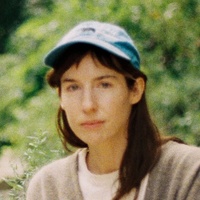On trusting the timing
Prelude
R.B. Schlather is an American artist and opera director, associated with immersive installations and unconventional stagings that push the boundaries of traditional operatic performance. His work has been praised for challenging conventional norms, and creating new and engaging experiences for audiences. In 2023 he was profiled in the New York Times as a rare American opera director bringing “fresh visions to Europe’s opera stages.”
Conversation
On trusting the timing
Opera Director R.B. Schlather on embracing cycles of nature in his creative work, being patient, and working with extremes.
As told to Annie Bielski, 2862 words.
Tags: Music, Process, Creative anxiety, Inspiration, Collaboration.
You’re an opera director whose process includes creating maquettes of the stage. They are striking works of art on their own, and I love how pared down they are, usually with a touch of something fluorescent. Have you always worked this way?
It came out of the pandemic. I had just started a design process, and suddenly, we weren’t sure if that show was going to happen and I was stuck in my house and I just needed to create. So, I started working on the show with the materials I had in my house, and I discovered that I could do it. That’s grown as I get more and more work. I’m not a trained set designer, but I react to a space and to figures in a space, and it activates my imagination. A problem that I have with a lot of stage design is that it gets very decorative, and in a way, because I don’t have the techniques, the things that I create are very humble. But also, I’m thinking—what do you actually need to tell the story?
I’ve never articulated this before, but [the process of making the maquettes is] trying to communicate something about the project and the piece. Through the process of trying to articulate that, they become these kind of beautiful, surprising things. I didn’t sit down thinking, “Oh, I want to make something with this purple styrofoam.” I looked at the dimensions of the stage and I was like, “Okay, I’m going to really need something big and sturdy to build this on.” I happened to have that in the room, so I started with that. So there’s a kind of yes and, improvisatory, found quality.
I’m really so tickled by how many people respond to them, because I think they are very humble and speak to an almost childlike, innate kind of imagination and creativity. I mean, when I was a kid, I would just stay in my room and listen to the Met Opera on the radio, cut up pieces of cardboard and build little worlds. So, clearly there’s some past life stuff going on. I don’t come from a theater family, and there’s this need to communicate in this way.
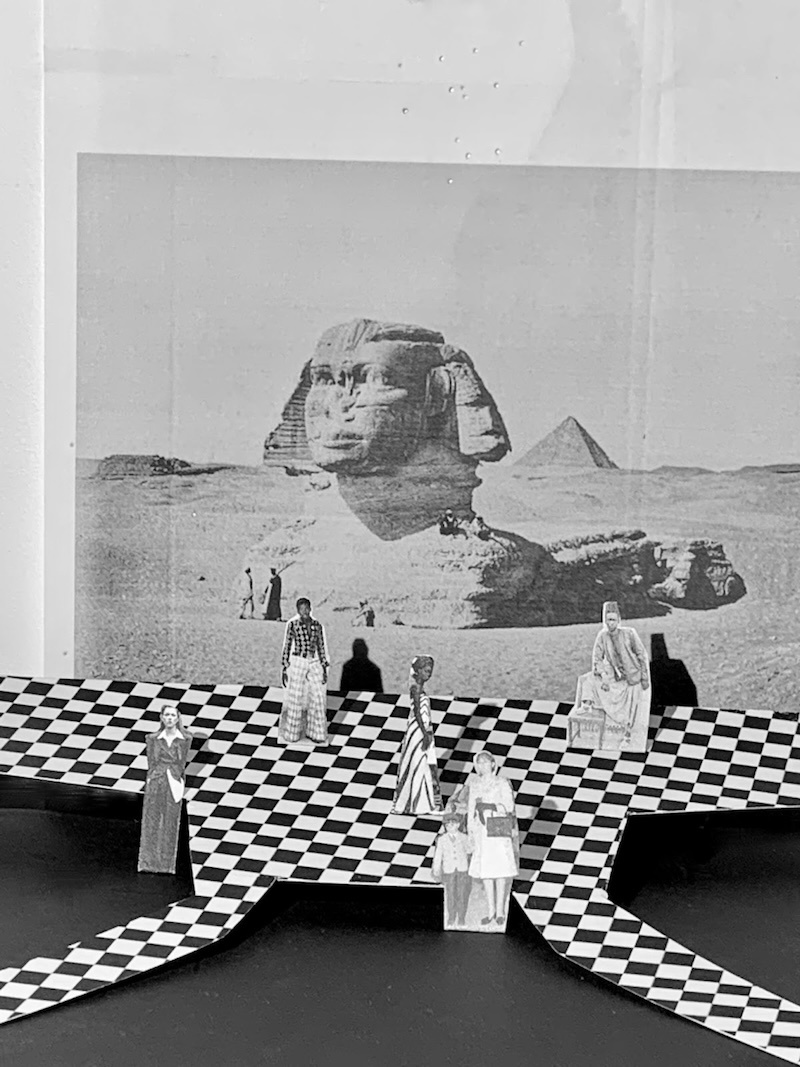
Giulio Cesare study 2021
You were introduced to opera young.
My parents moved to Cooperstown, which is this middle of nowhere mountain town around a lake, when this opera company was founded. I guess in the ’70s, it was really popular for small towns to have opera companies. I remember as a kid that every little city around Syracuse, Binghamton, Oneonta all had theaters. In my memory, it was good quality. My parents got involved in the way that everybody got involved. Glimmerglass started doing shows in the high school in town because that was the biggest auditorium, and it just grew and grew and grew.
Eventually, someone donated a turkey farm on the banks of the lake, they hired an architect, a bunch of people raised a ton of money, and they built this beautiful summer opera house with sliding walls. When you arrived at the opera house, it was sort of open air, and you’d smell the cow manure from the farms nearby coming through on a particularly ripe day. To darken the theater at the beginning of the show, these giant walls would close, and suddenly you’re in this dark space, and during the intermission the walls would open. So, it had this incredible architectural pageantry. It was fabulous and magical. They would do four shows every summer from different eras, so you’d get a real encounter with different styles of opera. It had a very European aesthetic because they were bringing in lots of European production teams to design and direct things. And they were doing stuff that was a little more avant garde, meaning they were moving beyond the top 20 most produced titles and bringing in deep cuts, things nobody had ever heard of, things that had never been done in the US before.
It was a great education. I think a lot about the initial things that really attracted me and I try to bring them to the work—something that feels more like a happening, something that feels special and one-off. There’s a kind of urgency to the experience because it is this live thing, this encounter with live music, with these singing bodies, with musicianship, with really niche craftsmanship in a rather intimate space. And hopefully, it’s being performed at a kind of level that is a bit extreme, a bit over the top, a bit visceral.
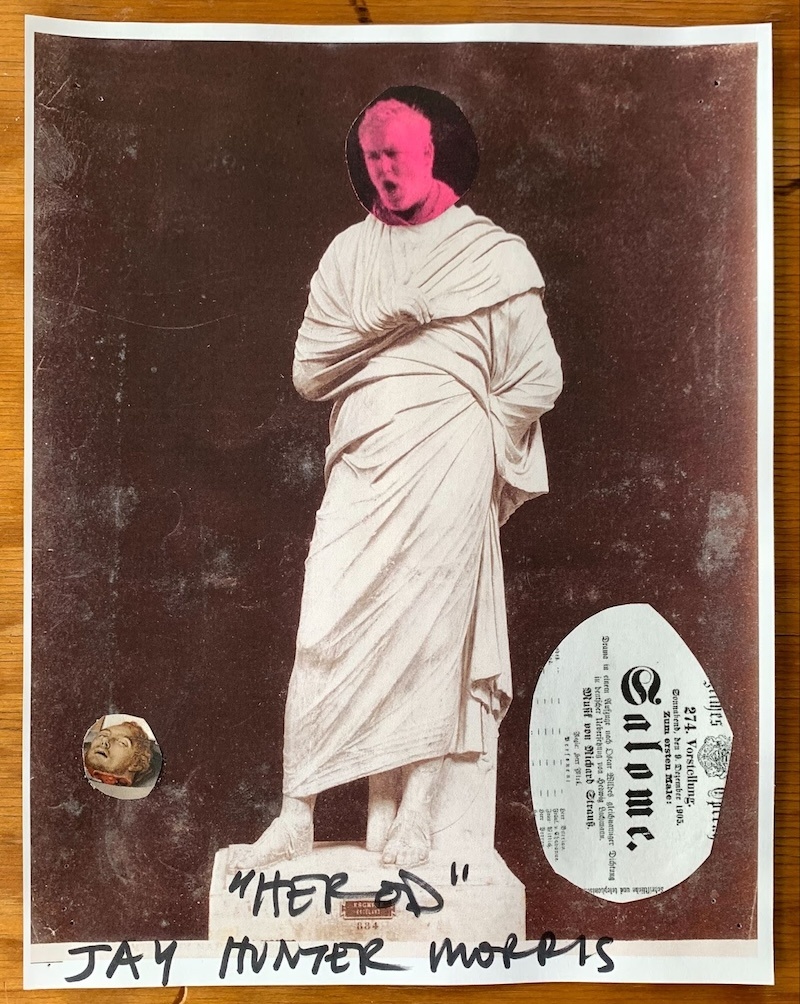
Salome study, 2021
You’re working with material that’s been rendered before, aside from the world premieres you’ve directed. What about that is exciting?
I love it. I find it incredibly liberating to know, “Okay, I’ve got two and a half hours of time, I have to fill that with spectacle. I have to come to terms with these characters and how they develop. I have to deal with space. I have to hold an audience’s interest. Also, what’s the story about? Why is it unfolding?”
Sometimes, you’re working on shows that are written in the Aristotelian 24-hour time zone, meaning these characters start going through their drama, and it all kind of resolves within a 24-hour period. Maybe the show starts in the morning, then by the middle of the show it’s evening, and then by the end of the show it’s dawn. I like those kinds of shows because there’s more of a feeling that something’s happening in real time, even though time is suspended because obviously it’s not real time, it’s constructed. I’m doing a premiere in Germany this Fall, and it’s really unclear what the period of time is that it unfolds over. So in our process we have given it a time period, but not historical. It starts around Halloween and then the second part becomes Christmas and the last part becomes Easter. So, it sort of has a visual chronology, just to try to focus the story.
That’s another thing I like about opera—it’s poetic. To me, there’s nothing literal about the art form. That’s why it’s so fabulous. It’s emotional, it’s visual, it’s abstract, it’s about ideas. It’s this thing from the past that we get to encounter, which I think is so exciting. But I like old things. I like things that have the hand, that have a history. I think that’s why I like working with found materials too, because they have a certain energy.
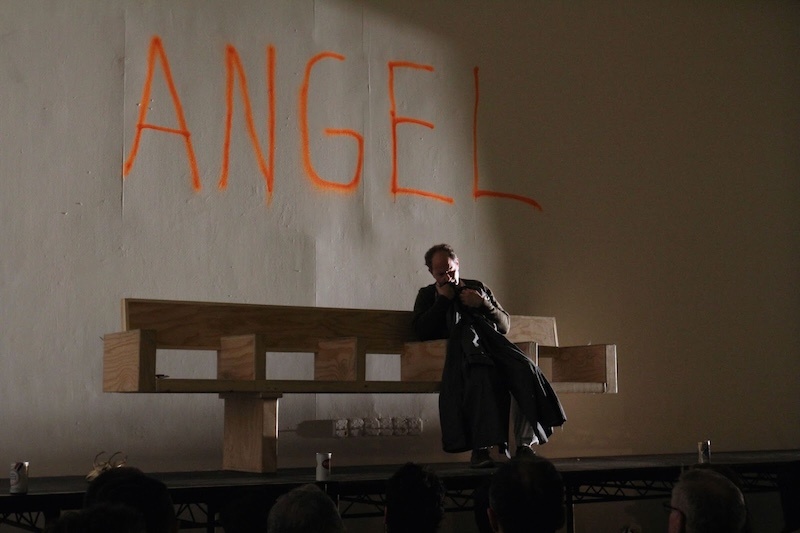
Orlando, 2015. Photograph by Tina Fineburg.
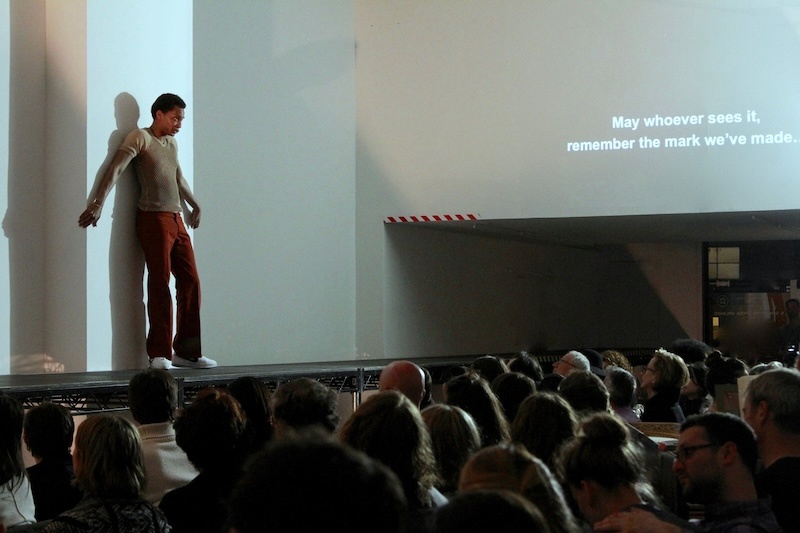
Orlando, 2015. Photograph by Tina Fineburg.
I’m interested in extremes. I like extreme color. I like an extreme shape. I like an extreme personality. I like an extreme gesture. We’re watching the Real Housewives of Salt Lake City right now—fabulous. They’re walking around in this weird snowscape, and they’re so painted and artificial, and their emotions are so wild and it is so OTT, and I love it. So, yeah, this combo of something that’s very emotional and very visual, that’s what I get very turned on by. And that to me is what opera should be. There’s nothing more criminal than going to an opera where people are in sort of staid colors, being very prim.
How do you collaborate?
I think the best processes have a collaboration from the beginning with the other designers to create the environment, or to conceptualize the production in space. The rehearsal room becomes really collaborative, meaning I really need performers who are going to come with a strong idea about their characters and an understanding of what people are saying around them in a scene, and a certain physical awareness too. That actually takes a really specific kind of performer.
Not every opera singer wants to be so physical, wants to get messy. Some of them like to be quite elegant and put together, but I usually think that the reason characters are in an opera is because they’re experiencing the most insane day of their life, and that’s what we’re going to see. And so, I sort of require the performers to get really wild and messy, and go on that journey so that we can go with them and be thrilled by them and be horrified by them and be moved by them; be reminded of our own messiness, our own potential for mania, forgiveness, hope, despair. I guess that’s why these shows need to be liberated from a time period. For me, if you’re doing an opera from 1724, there’s no reason why you should set it in 1724 because it has nothing to do with 1724 other than understanding why these people in 1724 composed this work.
Having spent so much time with their work, do you feel you know the composers?
I think the more time I spend with Handel, I certainly feel like I have some kind of sense of him. I certainly have a sense of how he creates theater, or how he thinks about spectacle. I read a great thing years ago that what opera is, is this mashup of dramatic music, poetic text and movement, physicality, and spectacle.
What I took from that is—it’s not decorative music, it’s not background music. It’s supposed to describe some narrative thing like a storm or a battle, or supposed to describe an emotional event. And the things that people say—it’s not literal, it’s poetic. There’s a lot of space around it. There’s room for interpretation. What I’m tasked to do is to find the physical expression of those things with the person that’s standing in front of me in the environment we’re in for the audience that’s watching them. So, my work always has a real starting point. What then comes out of that is why I keep doing it because that’s kind of the addiction—that time when you’re finally in the room with the performers making the thing, seeing what’s going to happen.
I think the more I understand the world that these pieces come from, specifically Handel writing in the 18th century, the more I understand that these works are not holy, they’re not on a pedestal. You don’t have to do all four hours of one of his operas, because oftentimes, he would cut them up and rearrange things and put things in different orders depending on which singers were doing it that night, or how long he could be in the theater. He was a hustler. He was trying to make a buck. It wasn’t just divine. I try to bring that to my work, which is a bit more, “Let’s cut this thing up, let’s mash it up. Let’s see where it goes. Let’s make it personal.”
It’s not precious.
It’s not precious, just because it’s from the past. I think so often, maybe because of the way we’re taught about the past, it gets a kind of hierarchy. So often that says more about the pedagogy than it does about the actual thing itself, more about the preoccupations of the person who’s teaching.
Earlier you mentioned the container of time—you know you have two and a half hours to fill with spectacle. How do you set up your creative time?
I’m always trying to figure that out, so if you have any good ideas, I’m really open [laughs]. There was one period of time when I was very busy and I had five shows going on at once, and so as a way of organizing myself, Monday was one show, Tuesday was the other show, Wednesday another, Thursday was a day off or a studio day, Friday—that was an attempt to try to streamline emails and keep projects moving and stay on top of deadlines. But, I feel increasingly like everyone is so chaotically available and working on things that sometimes setting these kinds of limits, like “I’ll only work on this on Friday,” actually becomes a kind of detriment to your flow. But then, I also don’t like the idea of waking up at 3:00 AM and writing a bunch of emails because I’m suddenly in the mood. That doesn’t feel healthy either, or helpful to my collaborators. So, more often than not, I end up feeling stuck.
But I ran into [friend and neighbor] Nicole [Vidor] yesterday, and I was kind of saying that to her, and she said that her mantra right now is TTT, trust the timing. That’s a really weird aspect of my creative work, because so much of it is stuff that came out of nowhere, and so many things that I tried to initiate just went nowhere. So, sometimes the more you take your foot off the gas, the more you surrender, the more stuff starts coming at you in these kinds of in-between periods.
When I’m in rehearsal, that’s a more structured process because you usually rehearse six hours a day. Then outside of those rehearsals, you have shop visits or PR meetings or interviews. It’s a much more scheduled day and it becomes about showing up and trying to make stuff happen in the time you have. It’s this very strange, incredibly exciting work that I’m so passionate about, but has a very erratic flow, which can be strange for me.
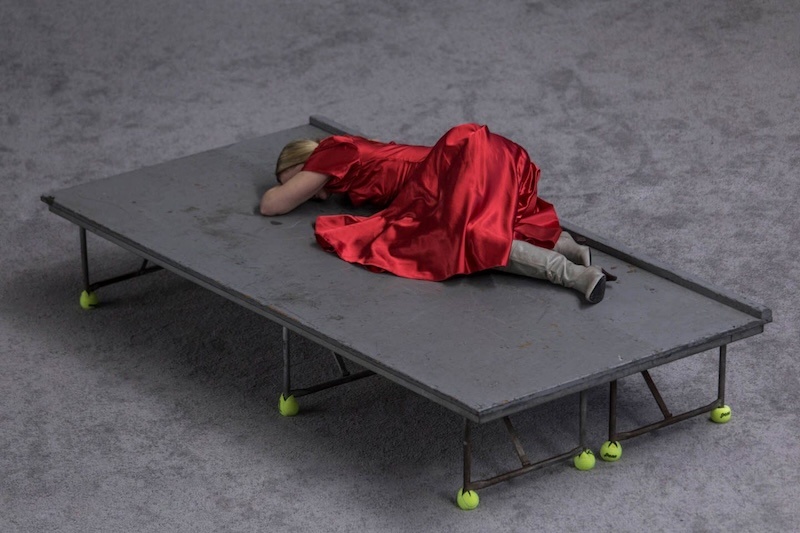
The Mother of Us All, Hudson Hall, 2017. Photo by Matthew Placek.
What do you do when you procrastinate?
Sit in this chair and stare at the wall, which I’ve heard is valuable time, but I have trouble with that. Procrastination is a huge problem. How do you deal with procrastination?
Search for end tables.
One of the kicks I’ve been on is, wake up and try not to look at any of my tech, make the coffee and go outside, walk the dog, feed the chickens, then go for a walk in the woods, two miles. Clear my head, do meditation stuff, listen to podcasts, and then come to the studio and then start doing emails. And then, there’s the couple hours of sitting and staring at the wall. I go home and make dinner and feel so relieved that I made it through the day.
That’s sort of the kick I’m on lately, which I don’t love. It’s not really working for me in terms of productivity. But it’s also winter and it’s freezing and there’s other stuff going on. I guess it sounds kind of cheesy to say—but I’m so inspired and passionate about nature and these cycles, and also seeds and the way you plant a seed, and then this extraordinary thing comes out of it. And also, that thing has a life and it’s done and dies, and then you compost it. That’s such a metaphor for so many aspects of our lives. So, I’m embracing these cycles and also understanding that some things are going to finish. I can spend up to three years developing a show, and then after the premiere, it’s over and it’s done. All these shows that I’ve done in Germany have all come back at this point. So, that’s very exciting. I’m not involved with the remounting of it, but it’s kind of exciting to know that this thing you’ve spent so much time gestating does have a life after you.

Rodelinda, Hudson Hall 2023. Photograph by Matthew Placek.
What would you tell your younger self?
Be patient. And go for more walks in the woods—that’s so helpful to hear right now.
It is.
I feel like I must’ve been some kind of opera producer in a past life because it’s so strange that I’m so attracted to this art form. But from the earliest age, I just wanted to be doing it. And I mean, still in this downtime, that’s the envy, right? You look at other people and you’re like, “Oh, they’re in rehearsal right now, or they’re doing a show right now.” It’s just weird, irrational envy that really is from a place of wanting to be doing it, because that’s where I get a sense of service or a sense of, this is the thing I’m supposed to do, weirdly. Putting on these shows. All that is to say is that there was a lot of yearning, there was a lot of frustration about not being able to really do it. But now, I’ve been doing it for a long time, for almost 20 years. It’s so cool.
It’s so cool.
So, I just have to TTT, trust the timing.
R.B. Schlather Recommends:
The Tibetan Book of Living and Dying by Sogyal Rinpoche
Expectation is not the same as intention
BBC Gardeners’ World
Drink more water
Pasta Thursday
TRUST THE TIMING
- Name
- R.B. Schlather
- Vocation
- opera director
Some Things
Pagination

